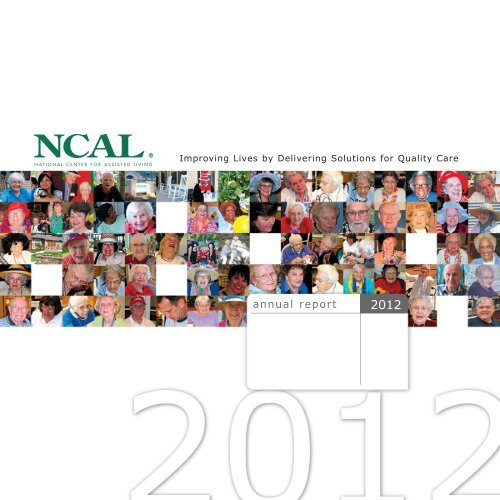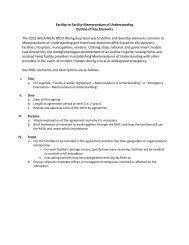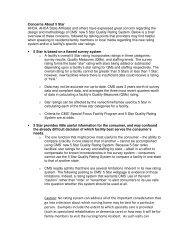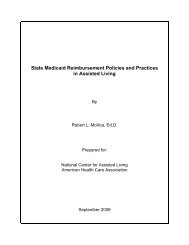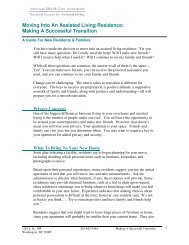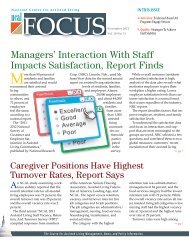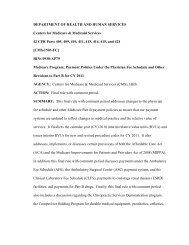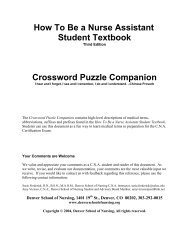NCAL 2012 Annual Report - American Health Care Association
NCAL 2012 Annual Report - American Health Care Association
NCAL 2012 Annual Report - American Health Care Association
You also want an ePaper? Increase the reach of your titles
YUMPU automatically turns print PDFs into web optimized ePapers that Google loves.
<strong>NCAL</strong> ®<br />
NatioNal CeNter for assisted liviNg<br />
Improving Lives by Delivering Solutions for Quality <strong>Care</strong><br />
annual report<br />
<strong>2012</strong>
Vision <strong>NCAL</strong> is dedicated to promoting high<br />
quality, principle-driven assisted living care and<br />
services with a steadfast commitment to<br />
excellence, innovation, and the advancement of<br />
person-centered care.<br />
Mission stateMent <strong>NCAL</strong>’s mission is to<br />
lead the assisted living profession through public<br />
policy advocacy, knowledge, education, and<br />
professional development.
Ashley Blankenship, At-Large Member<br />
Deb Choma, At-Large Member<br />
Vickie Cox, At-Large Member<br />
Helen Crunk, At-Large Member<br />
Marcia Hamilton-Cotter, At-Large Member<br />
Jeff Hyatt, At-Large Member<br />
Deborah Meade, At-Large Member<br />
Joseph Perkin, At-Large Member<br />
Laurie Shepard, At-Large Member<br />
Jan Thayer, At-Large Member<br />
<strong>NCAL</strong> <strong>2012</strong> Board of Directors<br />
Mike Shepard, <strong>NCAL</strong> Chair<br />
Patricia Giorgio, <strong>NCAL</strong> Vice Chair<br />
Christian Mason, <strong>NCAL</strong> Secretary/Treasurer<br />
Nicolette Merino, Immediate Past Chair<br />
Dee Thieme, At-Large Member<br />
Brett Waters, At-Large Member<br />
Kristin West, At-Large Member<br />
Roderick (Rod) Wolfe, At-Large Member<br />
John Poirier, ASHCAE Vice President<br />
Cindy Luxem, ASHCAE Representative<br />
Rich Miller, ASHCAE Representative<br />
Angie Szumlinski, ABM Representative<br />
Neil Pruitt, Jr., AHCA Chair<br />
Len Russ, AHCA Vice Chair<br />
Back row, left to right: Dave Kyllo, Deborah Meade, Brett Waters, Nicolette Merino, Rich Miller, Cindy Luxem, Roderick Wolfe, Jan Thayer, Vickie Cox,<br />
Kristin West, Deb Choma, Laurie Shepard, Joe Perkin, Jeff Hyatt, Mark Parkinson. Front Row, left to right: John Poirier, Len Russ, Ashley Blankenship,<br />
Mike Shepard, Patricia Giorgio, Christian Mason, Dee Thieme, Helen Crunk, and Marcia Hamilton-Cotter. Not pictured: Angie Szumlinski and Neil Pruitt.<br />
<strong>2012</strong> <strong>Annual</strong> <strong>Report</strong> | 1
2 | National Center for Assisted Living<br />
Mike Shepard, <strong>NCAL</strong> Chair — Arkansas
We started <strong>2012</strong> with tangible success with our<br />
lobbying efforts. Medicare Part D began covering<br />
prescription drug copays for assisted living residents<br />
who are eligible for Medicare and Medicaid on<br />
January 1, <strong>2012</strong>—a significant achievement resulting<br />
from several years of our work.<br />
<strong>NCAL</strong>’s discussions with key leaders of the Senate<br />
Special Committee on Aging about keeping<br />
regulation of assisted living on the state level were<br />
a success. These meetings helped demonstrate the<br />
profession’s commitment to quality and helped<br />
deter prospective regulation from being introduced.<br />
Our leadership and grassroots advocacy efforts are<br />
working. Last year, we warned you and other<br />
stakeholders about a dangerous proposed rule that<br />
threatened to exclude assisted living from<br />
participating in the Medicaid waiver program. After<br />
receiving 1,500 comments—many from <strong>NCAL</strong><br />
members—the Centers for Medicare and Medicaid<br />
Services (CMS) issued a new draft proposal. The<br />
revised version is an improvement but we still have<br />
serious concerns that we are asking CMS to address.<br />
Member participation in grassroots activities is critical<br />
to <strong>NCAL</strong>’s success in the policy arena. We now have<br />
more than 1,000 members in the e-advocacy<br />
program. More members have hosted members of<br />
Congress on tours of their communities. To those of<br />
Letter from <strong>NCAL</strong>’s Chair<br />
As chair I am proud to present <strong>NCAL</strong>’s <strong>2012</strong> annual report. During the<br />
past year, we influenced federal policy, advanced quality, provided<br />
resources, and offered more education opportunities for you.<br />
you who are active members—thank you! For those<br />
who are considering hosting a tour, I encourage you<br />
to participate. The larger our grassroots program,<br />
the bigger our influence is on the federal level.<br />
<strong>NCAL</strong> pushed the quality bar even higher in <strong>2012</strong> by<br />
designing targets, measures, and tools for the<br />
AHCA/<strong>NCAL</strong> Quality Initiative for Assisted Living.<br />
Members who are using the tools are raving about<br />
them, because these tools are helping them improve<br />
quality and offering a way to communicate quality<br />
outcomes to important referral sources as the health<br />
care system for seniors continues to evolve.<br />
Finally, our inaugural <strong>2012</strong> <strong>NCAL</strong> Spring Conference<br />
in New Orleans—an effort to provide more assisted<br />
living specific education to members—was well<br />
attended and received outstanding ratings. <strong>NCAL</strong>’s<br />
Board responded to attendees’ request to host<br />
another conference in 2013, which will be held<br />
March 12 and 13, in Ft. Lauderdale, Fla.<br />
I feel privileged to represent people who are personally<br />
committed to providing the best care and services to<br />
residents, and I look forward to advancing our mission.<br />
Regards,<br />
Mike Shepard<br />
<strong>2012</strong> <strong>Annual</strong> <strong>Report</strong> | 3
Advocacy Influences National<br />
Organizations and Federal Policies<br />
<strong>NCAL</strong>’s staff helped divert the introduction of federal disclosure<br />
legislation by educating key Senators and their staff about how states<br />
actively legislate and regulate assisted living, and how <strong>NCAL</strong> initiatives<br />
are improving quality.<br />
4 | National Center for Assisted Living<br />
Cindy Luxem, President/CEO KHCA/KCAL, and Ashley Blankenship, <strong>NCAL</strong> At-Large Board Member, Arkansas.
“<strong>NCAL</strong> had to get active quickly, and it did just that. Through comments<br />
submitted to CMS and lobbying, CMS finally heard the message that assisted<br />
living must be a part of the solution in caring for an ever growing senior<br />
population,” Mike Shepard, <strong>NCAL</strong> Chair.<br />
<strong>NCAL</strong> continued a leadership role opposing<br />
provisions in the Centers for Medicare and<br />
Medicaid Services (CMS) proposed rule that<br />
threaten assisted living providers participation in<br />
Medicaid. <strong>NCAL</strong> rallied our members, educated<br />
members of Congress about the proposed rule,<br />
submitted formal comments, and worked with<br />
other national groups. After receiving about 1,500<br />
comments, CMS issued a new draft definition of<br />
home- and community-based settings. Although<br />
the latest proposal is an improvement from<br />
previous versions, it doesn’t eliminate a threat for<br />
nearly 19 percent of the nation’s assisted living<br />
residents receiving Medicaid covered care and<br />
services. <strong>NCAL</strong> members submitted comments<br />
objecting to those remaining provisions.<br />
In addition, a five-year effort resulted in two major<br />
life safety codes being modified so that they are<br />
consistent with each other. The National Fire<br />
Protection <strong>Association</strong>’s Life Safety Code and the<br />
International Code Commission’s International<br />
Building Codes are used to set standards for<br />
assisted living communities. <strong>NCAL</strong>’s suggested<br />
revisions to both codes were adopted by the<br />
respective organizations. The codes maintain<br />
resident safety and save assisted living providers<br />
from expensive building retrofitting.<br />
Detailed Policy and Advocacy Work<br />
The Home- and Community-Based<br />
Setting Definition<br />
• Intervened with CMS by asking the agency to<br />
stop premature implementation in some regions<br />
of the HCBS proposed definition before the rule<br />
is finalized.<br />
• Explained in formal comments that CMS’s<br />
revised proposed rule still contained provisions<br />
that could disqualify assisted living providers<br />
serving individuals with Alzheimer’s or other<br />
forms of dementia from Medicaid waiver<br />
programs.<br />
• Lobbied key leaders of the Senate Special<br />
Committee on Aging about regulation of assisted<br />
living and the importance of retaining regulation<br />
on the state level as part of the oversight hearing<br />
“Ensuring Quality in Assisted Living.”<br />
Issues Impacting Veterans Aid &<br />
Attendance Program<br />
• Evaluated legislation that would establish a<br />
look-back period similar to Medicaid for the<br />
Veterans Administration’s Aid & Attendance<br />
<strong>2012</strong> <strong>Annual</strong> <strong>Report</strong> | 5
6 | National Center for Assisted Living<br />
program. Worked with the <strong>American</strong> Legion, one of<br />
the nation’s largest veterans group—to build<br />
consensus and coordinate <strong>NCAL</strong>’s position on the<br />
legislation. <strong>NCAL</strong> believes that adding a look-back<br />
period would make applying for the benefit more<br />
difficult for veterans, and recommended the VA<br />
reduce the backlog of applications and increase the<br />
speed of the approval process.<br />
• Warned members about unscrupulous financial<br />
advisors and attorneys’ tactics that include charging<br />
veterans to apply for VA benefits and persuading<br />
veterans to transfer their personal assets into<br />
financial instruments that would not benefit them.<br />
Life Safety and Building Guidelines Synced<br />
• Ensured future construction and design guidelines<br />
of assisted living communities included assisted<br />
living developers’ perspective. Numerous<br />
recommendations developed by <strong>NCAL</strong> Board<br />
members were accepted by the Facilities Guidelines<br />
Institute during the first round of consensus<br />
building for the 2014 edition of The Guidelines for<br />
Design and Construction of <strong>Health</strong> <strong>Care</strong> Facilities.<br />
The guidelines are used by more than 42 states and<br />
several federal agencies to regulate health care<br />
facility design and construction in the United States.<br />
• Obtained approval from the National Fire Protection<br />
(NFPA) for <strong>NCAL</strong>’s technical changes to the <strong>2012</strong><br />
published Life Safety Code that maintain high safety<br />
standards and allowed assisted living communities to<br />
remain in the residential life safety category.<br />
AHCA Chair Neil Pruitt Jr. gives Jan Thayer, <strong>NCAL</strong> At-Large Board Member<br />
and <strong>NCAL</strong> Past Chair, the association’s prestigious Chairman’s Award.
• Harmonized International Building Code standards<br />
for assisted living with the NFPA’s Life Safety Code<br />
for <strong>2012</strong>. This saves members from needlessly<br />
spending funds to retrofit their existing communities<br />
while maintaining resident safety standards.<br />
Advocacy Training and Policy Education<br />
• Trained <strong>NCAL</strong>’s Board of Directors and State Leaders<br />
on effectively conducting meetings and conveying<br />
<strong>NCAL</strong>’s policy positions to members of Congress<br />
during Capitol Hill visits and assisted living<br />
community tours.<br />
• Educated and published resources about how the<br />
Affordable <strong>Care</strong> Act provisions would impact<br />
members.<br />
• Produced and disseminated the <strong>NCAL</strong> <strong>2012</strong><br />
Assisted Living State Regulatory Review and analysis<br />
of trends. This report demonstrates that states are<br />
continuously creating new legislation to regulate<br />
assisted living.<br />
• Worked extensively with the U.S. Department of<br />
<strong>Health</strong> and Human Services’ Center for <strong>Health</strong><br />
Statistics on its second national survey of assisted<br />
living.<br />
<strong>2012</strong> <strong>Annual</strong> <strong>Report</strong> | 7
Advancements in Quality Programs Equip<br />
Providers with Vital Tools<br />
Demonstrating its commitment to quality, <strong>NCAL</strong> developed the assisted living<br />
side of the AHCA/<strong>NCAL</strong> Quality Initiative and adapted tools specifically for<br />
its assisted living members. <strong>NCAL</strong>’s Board of Directors approved a set of<br />
performance measures that will allow providers to benchmark and track<br />
clinical aspects of care like never before.<br />
From left to right, <strong>NCAL</strong> At-Large Board Members Rod Wolfe-Tennessee, Jeff Hyatt-Washington, and Laurie Shepard-Michigan.<br />
8 | National Center for Assisted Living
“This is an exciting time for quality at <strong>NCAL</strong>. We have tremendous<br />
opportunities to be leaders in quality measurement and improvement, which<br />
is demonstrated by our AHCA/<strong>NCAL</strong> Quality Initiative for Assisted Living.”<br />
Helen Crunk, Chair of <strong>NCAL</strong>’s Quality Committee, Nebraska.<br />
These clinical performance<br />
measures will help operators<br />
thrive in the new health care<br />
marketplace of accountable care<br />
organizations, managed care,<br />
and rising acuity of residents. For<br />
the third consecutive year, <strong>NCAL</strong><br />
issued its Performance Measures<br />
and Vacancy, Retention, and<br />
Turnover (VRT) surveys that cover<br />
10 areas of quality of life and<br />
operational performance<br />
including availability of licensed<br />
nurses, measurement of resident,<br />
family and employee satisfaction,<br />
if communities have resident<br />
councils; and other domains. The<br />
VRT is a nationwide survey of<br />
members and non-members<br />
regarding vacancy, retention, and<br />
turnover in five major job<br />
categories and 16 job positions.<br />
Quality Resources For Members<br />
• Launched the website for the<br />
AHCA/<strong>NCAL</strong> Quality Initiative<br />
for assisted living with goals,<br />
measures, and tools tailored<br />
specifically for assisted living<br />
providers developed by <strong>NCAL</strong>’s<br />
Quality and Workforce<br />
Committees. (See chart on<br />
page 11, AHCA/<strong>NCAL</strong> Quality<br />
Initiative Goals for Assisted<br />
Living)<br />
• Adapted INTERACT <br />
(Interventions to Reduce Acute<br />
<strong>Care</strong> Transfers) tools for<br />
assisted living providers and<br />
obtained approval of the<br />
revisions from the developers<br />
of INTERACT .<br />
Roger Bernier, chair of <strong>NCAL</strong>’s Workforce Committee, and Helen Crunk,<br />
chair of <strong>NCAL</strong>’s Quality Committee.<br />
<strong>2012</strong> <strong>Annual</strong> <strong>Report</strong> | 9
• Published assisted living criteria for the Bronze<br />
level of the AHCA/<strong>NCAL</strong> National Quality Award<br />
Program.<br />
• Encouraged members to apply for Bronze level<br />
AHCA/<strong>NCAL</strong> National Quality Award by<br />
producing a video for <strong>NCAL</strong>.org, hosting a<br />
60-minute webinar, and conducting an<br />
educational at convention. Bronze criteria helps<br />
members focus their quality improvement<br />
processes and meet Quality Initiative goals.<br />
• Conducted surveys and published findings from<br />
<strong>NCAL</strong>’s Performance Measures related to quality<br />
of life and staff Vacancy, Retention, and<br />
Turnover in assisted living communities. (See<br />
charts page 11)<br />
10 | National Center for Assisted Living<br />
• Examined proposals from Patient Safety<br />
Organizations that potentially would collect<br />
clinical data from members.<br />
• Participated in the National Dementia Initiative<br />
that seeks to develop consensus guidelines<br />
among stakeholders for non-pharmacologic<br />
practices for individuals with dementia.<br />
• Promoted best practices by hosting <strong>American</strong><br />
Assisted Living Nurses <strong>Association</strong> teleconferences<br />
and publishing <strong>Care</strong>giver Corner inserts written by<br />
co-founder of the National <strong>Association</strong> of <strong>Health</strong><br />
<strong>Care</strong> Assistants in <strong>NCAL</strong> Focus.<br />
Congressman Adrian Smith (R-Neb.) with Jayne Prince,<br />
administrator of The Willows, Neligh, Neb.
<strong>2012</strong> <strong>NCAL</strong> Performance Measures Survey <strong>Report</strong>*<br />
96.8% Had a licensed nurse available to staff and residents 24 hours a day, on-site or on-call<br />
91.1% Measured resident and family satisfaction<br />
80.6% Measured employee satisfaction<br />
87% Tracked retention and turnover<br />
*Survey open only to <strong>NCAL</strong> members.<br />
2011 Vacancy, Retention, and Turnover Survey**<br />
Overall Retention Rate: 71 %<br />
Overall Turnover Rate: 25 %<br />
Overall Vacancy Rate: 2.0 %<br />
**Professionwide<br />
AHCA/<strong>NCAL</strong> Quality Initiative Goals for Assisted Living<br />
Goal 1: Safely reduce<br />
hospital readmissions<br />
Measure: Number of<br />
residents discharged<br />
from the hospital to<br />
assisted living and<br />
readmitted to the<br />
hospital within 30 days.<br />
Goal 2: Improve staff<br />
stability<br />
Measure: The turnover<br />
of nursing staff (i.e.<br />
registered nurse,<br />
licensed vocational<br />
nurse/licensed practical<br />
nurse, certified nurse<br />
assistant) over the prior<br />
six months.<br />
Goal 3: Increase<br />
customer satisfaction<br />
Measure: The<br />
percentage of current<br />
residents/family who<br />
would recommend the<br />
community to others.<br />
The percentage of<br />
residents that moved<br />
out of an assisted living<br />
community who would<br />
recommend the<br />
community to others.<br />
Goal 4: Safely reduce<br />
the off-label use of<br />
antipsychotics<br />
Measure: The<br />
prevalence of off-label<br />
use of antipsychotics in<br />
residents. The<br />
percentage of residents<br />
who start off-label use<br />
of antipsychotics<br />
<strong>2012</strong> <strong>Annual</strong> <strong>Report</strong> | 11
“If we continue to combine our forces and keep the focus on our mission—to<br />
improve the lives of those who need our care—together we will be a force<br />
to be reckoned with,” Dave Kyllo, <strong>NCAL</strong> Executive Director.<br />
More Member Support<br />
• Received national recognition for promoting<br />
programs for seniors. Awarded the <strong>2012</strong><br />
Mature Media bronze award for <strong>NCAL</strong>’s 2011<br />
National Assisted Living Week program guide.<br />
• Improved public image of assisted living through<br />
a photo album called, Faces of Assisted Living<br />
and Art for the Ages, an exhibit of artwork<br />
created by members’ residents, both posted on<br />
<strong>NCAL</strong>’s website and social media site Pinterest.<br />
• Offered complimentary webinars on topics such<br />
as communication skills for frontline staff, better<br />
Growing Membership<br />
<strong>NCAL</strong> has grown significantly in <strong>2012</strong> to<br />
more than 3,000 member communities<br />
with more than 144,000 beds<br />
nationwide. <strong>NCAL</strong> exceeded its growth<br />
goals for the year thanks to all of its state<br />
affiliates. Nevada and New York launched<br />
assisted living programs this year. <strong>NCAL</strong><br />
staff traveled to more than 30 affiliates<br />
delivering presentations about national<br />
policy initiatives, quality and other topics.<br />
12 | National Center for Assisted Living<br />
serving Lesbian, Gay, Bisexual, and Transgender<br />
individuals in assisted living, and others.
<strong>NCAL</strong> ®<br />
NatioNal CeNter for assisted liviNg<br />
Improving Lives by Delivering Solutions for Quality <strong>Care</strong><br />
National Center for Assisted Living | 1201 L Street, N.W. | Washington, D.C. 20005 | 202-842-4444 | www.<strong>NCAL</strong>.org


